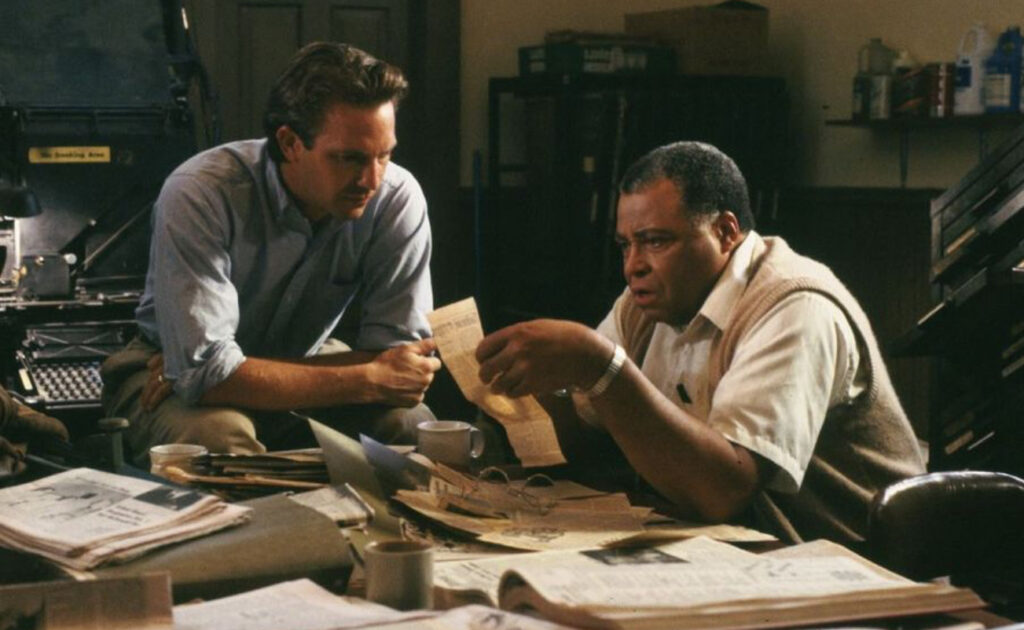Kevin Costner’s tribute to his “Field of Dreams” co-star, James Earl Jones, is not only a poignant acknowledgment of a great actor’s talent but also a heartfelt reminder of the magic that certain performances bring to the big screen. Costner’s words, praising Jones’ “booming voice,” “quiet strength,” and “kindness,” highlight the qualities that made Jones not only a memorable presence in the film but also a beloved figure in cinema. His tribute invites us to reflect on the significance of Jones’ role in “Field of Dreams”, the impact of his career, and the larger context of his contributions to the film industry.
James Earl Jones in Field of Dreams: A Defining Role
In “Field of Dreams”, Jones played the role of Terence Mann, a reclusive author who is sought out by Ray Kinsella (played by Kevin Costner) on a journey of self-discovery that intertwines baseball with the themes of dreams, redemption, and second chances. While Costner’s Ray is the film’s protagonist, Jones’ portrayal of Mann serves as its moral and emotional anchor. The character of Mann, based on the real-life author J.D. Salinger, carries a gravitas that contrasts with the film’s more whimsical elements, grounding the story in a sense of realism and intellectual weight.
Jones’ performance is marked by his characteristic “booming voice,” a voice that has become synonymous with authority and wisdom in film. Throughout the movie, Mann’s lines are delivered with a kind of rhetorical elegance that only Jones could bring to the role. His speeches, especially the famous monologue about baseball being “the one constant” in America, evoke a sense of nostalgia and timelessness that encapsulates the film’s themes. Costner, in his tribute, captures this quality perfectly, noting that “only he could bring that kind of magic to a movie about baseball and a cornfield in Iowa.” Indeed, Jones’ presence in the film elevates it from being merely a feel-good sports movie to something more profound—a meditation on the power of hope, dreams, and reconciliation.
Jones’ role in “Field of Dreams” also speaks to his versatility as an actor. Known for his powerful voice work, such as his role as Darth Vader in “Star Wars” and as Mufasa in “The Lion King”, Jones brought a quiet strength to the role of Terence Mann. While his voice in “Field of Dreams” still carried the authority for which he is famous, the performance itself was subdued, introspective, and filled with emotional depth. It was a role that required nuance, and Jones’ ability to embody both intellectual distance and emotional vulnerability made his character one of the most memorable aspects of the film.
The Power of Collective Showmanship: Kevin Costner and James Earl Jones
Kevin Costner’s tribute to James Earl Jones is a reflection not only on the actor’s talent but also on the deep respect and admiration that existed between the two actors. Costner, who was at the peak of his career during the making of “Field of Dreams”, has often spoken about the importance of connection in filmmaking. His praise for Jones, specifically noting his “quiet strength” and “kindness,” suggests that Jones brought more to the set than just his acting ability—he was also a supportive and compassionate presence.
In “Field of Dreams”, the dynamic between Costner’s Ray and Jones’ Terence Mann is central to the film’s narrative. Ray’s journey to find Terence is driven by his need for validation and understanding, and in many ways, Terence represents the figure of authority and wisdom that Ray is searching for. The chemistry between Costner and Jones on screen is palpable; their interactions are filled with a sense of mutual respect and understanding that lends authenticity to their characters’ relationship.
The scene in which Ray persuades Terence to come to the baseball field in Iowa is a testament to the power of their collaboration. As Ray pleads with Terence to believe in the impossible, the audience sees the internal struggle in Jones’ performance. His skepticism slowly gives way to curiosity, and eventually, to hope. It’s a subtle transformation, but it’s one that makes the moment when Terence finally steps onto the field all the more powerful. The interplay between Costner’s earnestness and Jones’ gravitas creates a compelling dynamic that carries the emotional weight of the film.
Costner’s tribute also highlights the personal connection that the two actors shared. In remembering Jones’ “kindness,” Costner seems to be alluding to the supportive nature of their off-screen relationship. It’s clear that Costner held Jones in high esteem not only as a professional but also as a person. This sense of camaraderie and mutual respect is often what elevates a film from being simply a job for the actors to being a meaningful experience, and it’s evident that this was the case for Costner and Jones during the making of “Field of Dreams”.
More than 30 years after its release, “Field of Dreams” continues to be regarded as one of the most beloved sports movies of all time. Its enduring popularity can be attributed to its universal themes of redemption, second chances, and the importance of family. But at the heart of the film’s success is its ability to capture the magic and mythology of baseball, a sport that holds a special place in American culture.
James Earl Jones’ role as Terence Mann is central to this mythology. In his famous monologue, Mann speaks about baseball being “the one constant” in America, a tradition that has survived through war, depression, and social upheaval. It’s a moment that resonates with audiences because it taps into a collective sense of nostalgia for a simpler time. Jones delivers the speech with such conviction and gravitas that it becomes one of the defining moments of the film.
The significance of this monologue cannot be overstated. In a movie filled with fantastical elements—a mysterious voice in a cornfield, ghostly baseball players, and time travel—it is Jones’ speech that grounds the story in reality. It reminds the audience that, while the film is about chasing dreams and believing in the impossible, it is also about holding on to the things that connect us to our past. Baseball, as Mann says, has been a constant presence in American life, and for many, it represents a connection to family, tradition, and memory.
In his tribute to Jones, Costner alludes to the fact that “Field of Dreams” would not have been the same without his co-star’s presence. It’s a sentiment that echoes the feelings of many fans of the film. Jones’ performance as Terence Mann elevated the movie from being a simple feel-good sports story to something more profound. His character’s journey from cynicism to belief mirrors the emotional arc of the film itself, and his final decision to step into the cornfield with the other ghostly players is a symbolic act of reconciliation and acceptance.
Impression
While James Earl Jones is perhaps best known for his roles in “Star Wars” and “The Lion King”, his career has spanned decades and included performances in theater, television, and film. He is widely regarded as one of the greatest actors of his generation, known for his commanding presence, distinctive voice, and ability to bring depth and humanity to every role he plays.
Jones’ contributions to the film industry go beyond his individual performances. As one of the few African American actors to achieve widespread acclaim in Hollywood during the 1960s and 1970s, Jones helped to pave the way for future generations of Black actors. His roles in films like “The Great White Hope” (for which he received an Academy Award nomination) and “Claudine” challenged racial stereotypes and offered complex, fully realized portrayals of Black characters at a time when such roles were rare.
In addition to his work in film, Jones has also had a distinguished career in theater. He won two Tony Awards for his performances in “The Great White Hope” and “Fences”, and he remains one of the few actors to have achieved the coveted EGOT status (winning an Emmy, Grammy, Oscar, and Tony). His influence on the stage has been just as significant as his impact on film, and he is widely regarded as one of the greatest stage actors of his time.
In reflecting on Jones’ career, it is clear that his legacy extends far beyond his individual performances. He has been a trailblazer in the industry, breaking down barriers and challenging the status quo, while also bringing a sense of dignity and humanity to every role he takes on. His work in “Field of Dreams” is just one example of the many unforgettable performances he has given over the years, but it is a role that has left an indelible mark on film history.
As we remember James Earl Jones, we can be grateful for the many unforgettable performances he gave us throughout his long and illustrious career. From his powerful voice work to his commanding on-screen presence, Jones brought a sense of magic to all roles he cautiously conjured to played.
No comments yet.








